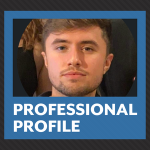Journal Manager, Frontiers
 |
Summarize yourself and professional experience in a few sentences.
I’m from London and lived most of my life there, but just recently moved across to Madrid because I like the sun. My academic background is in Zoology/Oceanography, and I currently manage the Robotics and AI journal at Frontiers, so quite a big shift!
Please describe the main function of your organization and your current responsibilities.
Frontiers is a commercial OA publisher, and we publish a broad range of titles across the sciences and, more recently, the arts and humanities. I would describe our team as the main “face” of the journal; we are responsible for the bulk of the content commissioning. We also interact often with lots of our editorial board members and do community outreach to help market the journal to roboticists globally.
How did you get into scholarly communications, and what was your path to your current role?
I’ve been here at Frontiers for nearly 4 years now and started with a 6-month internship as a commissioning assistant. I can’t say I’ve made any crazy moves jumping between different roles, as I have been in the same department throughout my time here.
What tools, websites, and organizations do you find most valuable for your career development?
I would highly recommend the SSP mentorship scheme. I was paired up with a really active and experienced mentor who was able to explain a lot about the industry and helped me out with some other opportunities.
What advice would you give to people interested in a career in scholarly communications?
I came into my first publishing role with absolutely no idea about anything in the industry. I had read papers, but that was the extent to what I knew. If I was to go back, I would probably read up some more about the different types of publishers and talk to some people in the industry if possible. I’ve definitely seen it be quite jarring for some people who come into a large commercial publisher expecting it to be like a small publisher or a university press.

